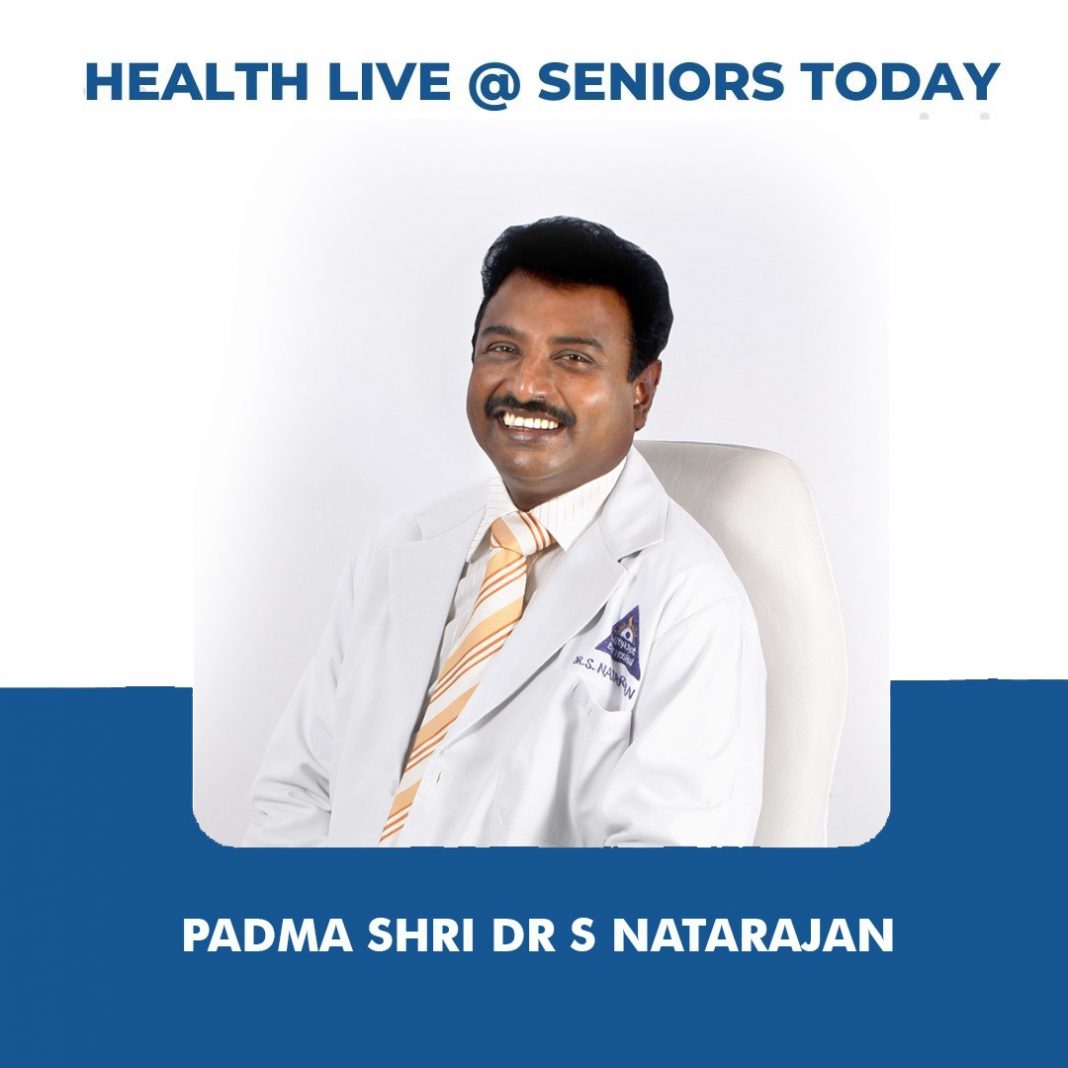On May 14, 2022, Seniors Today hosted its weekly Health Live webinar with eminent medical professional Prof Dr S Natarajan. He shed light on Retina Care for Senior Citizens.
Prof Dr S Natarajan is a Vitreoretinal Surgeon since 1984. A Padma Shri awardee, Dr Natarajan is a charter member of the Retina Hall of Fame. He is currently President of Tele Ophthalmic Society of India (TOSI) and APOTS (Asia Pacific Ophthalmic Trauma Society). He is the Worldwide Secretary General of GEGC (Global Eye Genetics Consortium), Board Trustee, International Council of Ophthalmology (ICO), Board Member, International Society of Ocular Trauma.
He has given more than 2500 guest lectures all over the world. He has authored more than four books, and peer reviewed more than 100 publications.
He has the Guinness world record of screening maximum number of diabetic retinopathy cases. He has conducted more than 60,000 Vitreoretinal surgeries.
– The eye is a camera and the retina is the film of this camera. And for this camera to produce a clear picture, it is important to have a clear cornea which is the front or the open space in a regular camera, a clear lens and a clear vitreous; only then a stark and clear picture will be formed by the film ie the film on the camera.
– The macula is responsible for the accuracy, clarity, colour, brightness and fine vision.
– Some common retinal conditions include:
- Posterior vitreous detachments (PVD)- floaters
- This is a natural change that occurs as the age of the individual advances. When the vitreous gel in the eye separates from the retina, and becomes liquid in form, the small pieces of gel that might float in the eye for the floaters are seen.
- If you have a sudden increase in the number of floaters, you should go see a retina doctor so they can dilate your eyes, check the retina and make sure that the peripheral retina is attached.
- If a floater is associated with seeing flashes of light in the eyes, it is also important that you go visit an ophthalmologist and have it checked.
- Retinal detachment
- It involves sudden loss of vision.
- In this case, the retina separates from the back wall of the eye, like a wallpaper peeling off a wall.
- Symptoms typically include:
Floaters
Flashes of light
Shadow or curtain in the peripheral vision and may involve the central vision as well.
- Risk factors for developing retinal detachment include:
Thinning of peripheral retina or the area outside of central retina
High myopia (nearsightedness)
Advance age
Family history of retinal tears or retinal detachment
History of eye surgery for eg cataract surgery
Trauma to the eye
- Age related macular degeneration
- It is the deterioration of the retina and choroid due to ageing that leads to a decrease in the sharpness of the vision.
- It is the leading cause for significant loss of visual acuity in people over the age of 50 in developed countries.
- Symptoms include:
Sudden appearance of a black spot in front of your eye. This is the end stage of age related macular degeneration.
You can also google “Amsler Grid” and have it placed in your room where you can ensure that the vertical and the horizontal line appear straight and that there is no curve in either of the two.
- It produces central vision loss.
- Diabetic retinopathy
- This is a complication of long standing, uncontrolled diabetes mellitus that can cause damage to the blood vessels of the retina- causing blood, fluids and cholesterol to peak out of the vessels and deposit in the retina leading to damage of the retina and further loss of vision.
- Long-standing, uncontrolled or undiagnosed diabetes is the main risk factor for diabetic retinopathy.
- So, if you’re a diabetic it is recommended that you get your retina checked regularly to look for any salty changes of diabetic retinopathy.
- Retinal vein occlusion
- Central retinal vein is the main vein that drains blood from the retina closed off partially or completely.
- This causes blurred vision and swelling of the central part of the retina (macular oedema)
- Retinal artery occlusion
- This refers to the blockage of the retinal artery, carrying oxygen to the nerve cells of the retina. § This can be choked by cholesterol plaques.
- If not treated within 60 mins of the sudden loss of vision, it can cause permanent damage of vision.
- The above 2 can also be accelerated by hypertension, diabetes mellitus.
8 tips for healthy eyes
- Regular eye check ups. Particularly if you’re wearing glasses, annually. If you’re over the age of 40, you should get your eyes checked for glaucoma, near and distance vision and retina.
- Blink frequently.
- Keep and excellent distance of minimum of 25 cm and maximum of 70cm from the screen
- Eye exercises
- Keep proper lighting when you’re reading
- Wear sunglasses when you’re out in the open to avoid exposure to the UV rays.
- Gaze at colour green
- Eat a healthy and nutritious diet.




